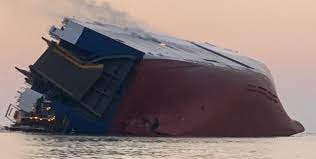The ship’s manager and the Portuguese military said a huge cargo vessel carrying vehicles from Germany to the United States sank Tuesday in the mid-Atlantic, 13 days after a fire broke out on board.
The Felicity Ace sank while being towed around 400 kilometers (250 miles) off the coast of Portugal’s Azores Islands, according to MOL Ship Management in Singapore. The fire had been put out by a salvage team.
According to the ship’s manager, the 200-meter-long (650-foot-long) vessel was listed to starboard before sinking.
The sinking was confirmed by the Portuguese navy, which stated that it occurred outside of Portuguese territorial seas. When the fire first broke out, a Portuguese Air Force chopper rescued the 22 crew members, stranding the ship.
To cool the ship’s hull, ocean-going tugboats equipped with firefighting equipment were hosing it down.
The number of cars on board the ship remained unknown, although ships the size of the Felicity Ace can transport at least 4,000 vehicles.
European automakers declined to say how many vehicles and models were on board, but Porsche said customers in the United States had been notified by their dealers.
In an email to reporters, Angus Fitton, vice president of PR at Porsche Cars North America, Inc., said, “We are already working to replace every car affected by this occurrence, and the first new cars will be constructed soon.”
According to Portuguese police, the ship was delivering both electric and non-electric vehicles. The cause of the incident on Feb. 16 has been linked to lithium batteries used in electric vehicles; however, investigators claim they don’t have conclusive evidence.
Authorities were concerned that the ship might pollute the sea. 2,000 metric tons (2,200 tons) of fuel and 2,000 metric tons (2,200 tons) of oil were carried by ship. It has a cargo capacity of almost 17,000 metric tons (18,700 tons).
Only a few bits of wreckage and a small area of oil were visible where the ship went down, according to the Portuguese navy. According to the report, tugboats were using hoses to rip up the patch.
On the lookout for evidence of pollution, a Portuguese Air Force jet and a Portuguese naval vessel will remain in the area.

















